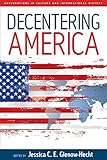Decentering America / ed. by Jessica C. E. Gienow-Hecht.
Material type: TextSeries: Explorations in Culture and International History ; 4Publisher: New York ; Oxford : Berghahn Books, [2007]Copyright date: ©2007Description: 1 online resource (422 p.)Content type:
TextSeries: Explorations in Culture and International History ; 4Publisher: New York ; Oxford : Berghahn Books, [2007]Copyright date: ©2007Description: 1 online resource (422 p.)Content type: - 9781845454999
- 9781782387985
- 973.072 22
- E175.7 .D43 2007
- online - DeGruyter
| Item type | Current library | Call number | URL | Status | Notes | Barcode | |
|---|---|---|---|---|---|---|---|
 eBook
eBook
|
Biblioteca "Angelicum" Pont. Univ. S.Tommaso d'Aquino Nuvola online | online - DeGruyter (Browse shelf(Opens below)) | Online access | Not for loan (Accesso limitato) | Accesso per gli utenti autorizzati / Access for authorized users | (dgr)9781782387985 |
Frontmatter -- CONTENTS -- ILLUSTRATIONS -- EDITOR’S PREFACE -- CONTRIBUTORS -- INTRODUCTION Decentering American History -- Part I INVERTING AMERICANIZATION -- Chapter 1 WHO SAID “AMERICANIZATION”? The Case of Twentieth-Century Advertising and Mass Marketing from a British Perspective -- Chapter 2 DIE ANTIDEUTSCHE WELLE The Anti-German Wave, Public Diplomacy, and Intercultural Relations in Cold War America -- Part II INTERNATIONALISM -- Chapter 3 CHINESE DEBATES ON MODERNIZATION AND THE WEST AFTER THE GREAT WAR -- Chapter 4 “FOR THE GENUINE CULTURE OF THE AMERICAS” Musical Folklore, Popular Arts, and the Cultural Politics of Pan Americanism, 1933–50 -- Part III NON-GOVERNMENTAL INFLUENCES -- Chapter 5 “THE OTHER SIDE OF THE WAR” Memory and Meaning at the War Remnants Museum of Vietnam -- Chapter 6 AMERICANIZED PROTESTS? The British and West German Protests against Nuclear Weapons and the Pacifist Roots of the West German New Left, 1957–64 -- Part IV CULTURAL VIOLENCE -- Chapter 7 MISPERCEPTIONS OF EMPIRE How Berlin and Washington Misread the “Ordinary Germans” of Latin America in World War II -- Chapter 8 RAPE AND MURDER IN THE CANAL ZONE Cultural Conflict and the US Military Presence in Panama, 1955–56 -- Part V DECENTERING THE WORLD? THE CULTURE OF DIPLOMACY -- Chapter 9 THE MARRIAGE OF THAMES AND RHINE Reflections on the English-Palatine Relations 1608–32 and the Culture of Diplomacy in Early Modern Europe -- Chapter 10 SELF-PERCEPTION, THE OFFICIAL ATTITUDE TOWARD PACIFISM, AND GREAT POWER DÉTENTE Reflections on Diplomatic Culture before World War I -- INDEX
restricted access online access with authorization star
http://purl.org/coar/access_right/c_16ec
"Decentering" has fast become a dynamic approach to the study of American cultural and diplomatic history. But what precisely does decentering mean, how does it work, and why has it risen to such prominence? This book addresses the attempt to decenter the United States in the history of culture and international relations both in times when the United States has been assumed to take center place. Rather than presenting more theoretical perspectives, this collection offers a variety of examples of how one can look at the role of culture in international history without assigning the central role to the United States. Topics include cultural violence, inverted Americanization, the role of NGOs, modernity and internationalism, and the culture of diplomacy. Each subsection includes two case studies dedicated to one particular approach which while not dealing with the same geographical topic or time frame illuminate a similar methodological interest. Collectively, these essays pragmatically demonstrate how the study of culture and international history can help us to rethink and reconceptualize US history today.
Mode of access: Internet via World Wide Web.
In English.
Description based on online resource; title from PDF title page (publisher's Web site, viewed 25. Jun 2024)


